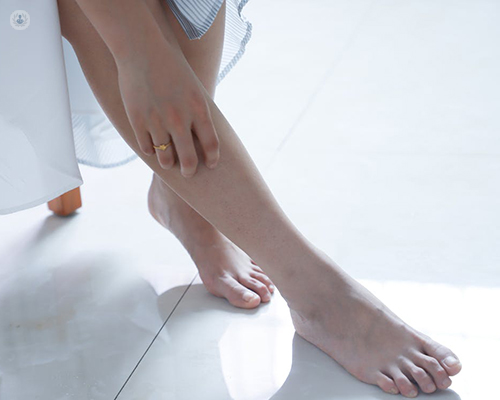What are spider veins?
Written by:Spider veins (also known as thread veins) are small pink or purple visually prominent blood vessels seen most often on the lower limbs, but they can occur on any part of the body. Their appearance can resemble that of a spider’s web or tree branches. Mr Ian Franklin, an experienced vascular surgeon, explains what spider veins are, their causes, and how they can be treated.

What causes spider veins? Are they a sign of poor circulation?
There is no specific cause of spider veins, but they are much more common in some people than others. They are not harmful in themselves, but they are frequently associated with faulty veins (for example varicose veins) which may or may not be visible in the same limb. Varicose veins can progress to more serious circulation problems, such as leg ulcers. It is important to check the veins inside the leg (usually with a duplex scan) before embarking on treatment for surface thread veins.
What can I do to prevent spider veins?
Thread veins cannot be prevented.
How do you get rid of them? (Is there a spider vein cream, can they go away on their own?)
There is no cream that treats thread veins and they never disappear on their own. The best way to treat thread veins is firstly to assess the lower limb circulation with a duplex scan to make sure the underlying veins are working properly. If any significant disorder is detected, such as varicose-type veins, these should be treated before addressing the thread veins. One analogy to explain this is it is wise to repair the roof of a house before starting the decorating, in order to obtain a durable result.
Is sclerotherapy the best method of treatment?
Sclerotherapy is a very good treatment for thread veins, provided it is done in the right way and provided there is no untreated faulty vein inside the leg contributing to the surface thread veins. Sclerotherapy is sometimes combined with laser treatment to get the best response. One single treatment session is seldom sufficient and the best results are usually achieved by spreading the treatments over a period of time. Using specialist lighting, magnification, tiny needles and high-resolution ultrasound all improve the results of sclerotherapy. Above all, it should not be rushed, but done carefully and meticulously.


This patient underwent sclerotherapy with Mr Ian Franklin, supplemented with laser to treat thread veins.
If you have spider veins and would like to enquire about having treatment, make an appointment with Mr Ian Franklin.


